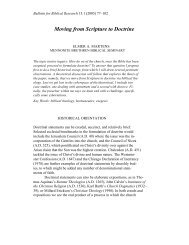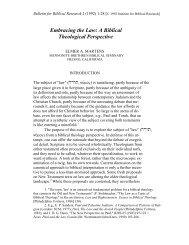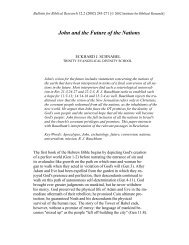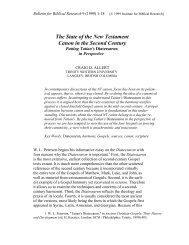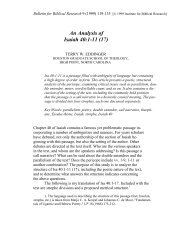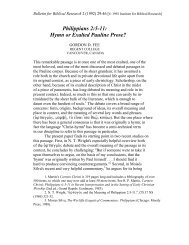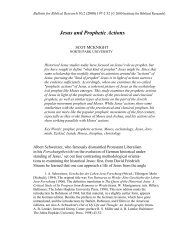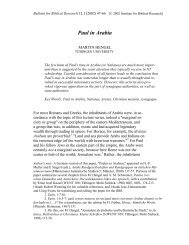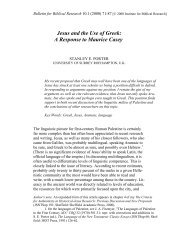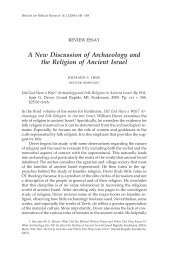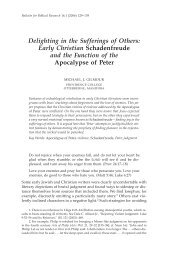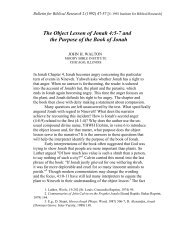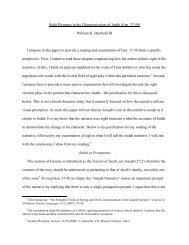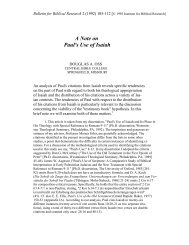The Integrity of the Biblical Canon in Light of Its Historical ...
The Integrity of the Biblical Canon in Light of Its Historical ...
The Integrity of the Biblical Canon in Light of Its Historical ...
You also want an ePaper? Increase the reach of your titles
YUMPU automatically turns print PDFs into web optimized ePapers that Google loves.
MCDONALD: <strong>The</strong> <strong>Integrity</strong> <strong>of</strong> <strong>the</strong> <strong>Biblical</strong> <strong>Canon</strong> 99<br />
<strong>of</strong> authority and exegesis for <strong>the</strong> Church, or is it ra<strong>the</strong>r <strong>the</strong> later<br />
canonical form <strong>of</strong> <strong>the</strong> text? <strong>The</strong> latter text admittedly has received<br />
many additions, some <strong>of</strong> which were <strong>in</strong>tentional and o<strong>the</strong>rs accidental.<br />
For <strong>in</strong>stance, is <strong>the</strong> orig<strong>in</strong>al form <strong>of</strong> Philippians that was made up<br />
<strong>of</strong> two parts (1:1-3:1 and 3:2– 4:23) 12 <strong>the</strong> canonical or authoritative<br />
text <strong>of</strong> <strong>the</strong> Church, or is it <strong>in</strong>stead <strong>the</strong> one that currently exists <strong>in</strong> our<br />
NT, which comb<strong>in</strong>es <strong>the</strong>se two orig<strong>in</strong>ally separate writ<strong>in</strong>gs <strong>of</strong> Paul?<br />
Does it matter how <strong>the</strong> Church preserved <strong>the</strong>se texts so long as <strong>the</strong>y<br />
are preserved <strong>in</strong> <strong>the</strong> biblical canon? Similarly, does it make a difference<br />
<strong>in</strong> one's read<strong>in</strong>g if <strong>the</strong> two parts are separated for study and<br />
preach<strong>in</strong>g? Is <strong>the</strong> Gospel <strong>of</strong> John best read as it was written, namely,<br />
as a s<strong>in</strong>gle gospel, or as <strong>the</strong> Fourth Gospel? Is <strong>the</strong> f<strong>in</strong>al form <strong>of</strong> Isaiah<br />
<strong>the</strong> authoritative base for preach<strong>in</strong>g and teach<strong>in</strong>g, or do we look for<br />
an earlier First, Second, or even Third Isaiah? Should we receive <strong>in</strong>to<br />
our biblical canon—<strong>the</strong>reby conferr<strong>in</strong>g authority on <strong>the</strong>m—such<br />
texts as Mark 16:9-20, John 21, and Acts 8:37, as well as o<strong>the</strong>r texts<br />
with questionable textual critical support, even though most scholars<br />
today agree that <strong>the</strong>se texts were later additions to <strong>the</strong> orig<strong>in</strong>al texts?<br />
Fur<strong>the</strong>r, should we accept as a part <strong>of</strong> our Scriptures only <strong>the</strong> earliest<br />
texts that are available to us today that most closely reflect <strong>the</strong> orig<strong>in</strong>al<br />
hand <strong>of</strong> <strong>the</strong> author? We might get a clue for our choices <strong>in</strong> this<br />
matter from <strong>the</strong> fact that <strong>the</strong> early Church grounded its <strong>the</strong>ology <strong>in</strong><br />
<strong>the</strong> witness from <strong>the</strong> apostolic community. 13<br />
___________________________________________________________<br />
Press, 1989). <strong>The</strong>y have been discussed more recently <strong>in</strong> detail <strong>in</strong> Otfried H<strong>of</strong>ius,<br />
"Isolated Say<strong>in</strong>gs <strong>of</strong> Jesus," New Testament Apocrypha (2d ed., Wilhelm Schneemelcher,<br />
ed.; Louisville, KY: Westm<strong>in</strong>ster/Knox, 1991) 1:88ff. <strong>The</strong> Agrapha are conveniently<br />
listed and discussed <strong>in</strong> James H. Charlesworth and Craig A. Evans, "Jesus <strong>in</strong> <strong>the</strong><br />
Agrapha and Apocryphal Gospels," Study<strong>in</strong>g <strong>the</strong> <strong>Historical</strong> Jesus: Evaluations <strong>of</strong> <strong>the</strong><br />
State <strong>of</strong> Current Research (ed. Bruce Chilton and C. A. Evans; NITS 19; Leiden: Brill,<br />
1994). In this article, Evans contends that <strong>the</strong>re is essentially noth<strong>in</strong>g new <strong>in</strong> <strong>the</strong><br />
agrapha that should cause concern or that would alter <strong>the</strong> understand<strong>in</strong>g <strong>of</strong> Jesus that<br />
is found <strong>in</strong> <strong>the</strong> canonical Gospels. See also Otfried H<strong>of</strong>ius, "Unknown Say<strong>in</strong>gs <strong>of</strong><br />
Jesus," <strong>The</strong> Gospel and <strong>the</strong> Gospels (ed. Peter Stuhlmacher; Grand Rapids: Eerdmans,<br />
1991) 336-60.<br />
12. It is likely that <strong>the</strong> letter to <strong>the</strong> Philippians is a composite <strong>of</strong> Paul's writ<strong>in</strong>gs,<br />
but on two separate occasions, namely, chapters 1:1-3:1 and chapters 3:2-4:23.<br />
13. Notice, for example, that Eusebius (Hist. eccl. 3.251.7) emphasizes both "apostolic<br />
style" and "orthodoxy" as criteria for genu<strong>in</strong>eness, and even <strong>the</strong> Muratorian<br />
Fragment l<strong>in</strong>es 73-80 excluded a work from consideration (Hermas), because it did<br />
not stem from <strong>the</strong> apostolic community. <strong>The</strong> rise <strong>of</strong> NT pseudepigraphy also demonstrates<br />
a desire to ground <strong>the</strong>ology <strong>in</strong> <strong>the</strong> witness <strong>of</strong> <strong>the</strong> apostolic community. <strong>The</strong><br />
early Church anchored its life and faith <strong>in</strong> God's activity <strong>in</strong> Jesus. Those writ<strong>in</strong>gs that<br />
were believed to be closer <strong>in</strong> time to him that also reflected <strong>the</strong> early tradition about<br />
him that was passed on <strong>in</strong> <strong>the</strong> Church were those writ<strong>in</strong>gs that survived and became<br />
canonical for <strong>the</strong> Church.



